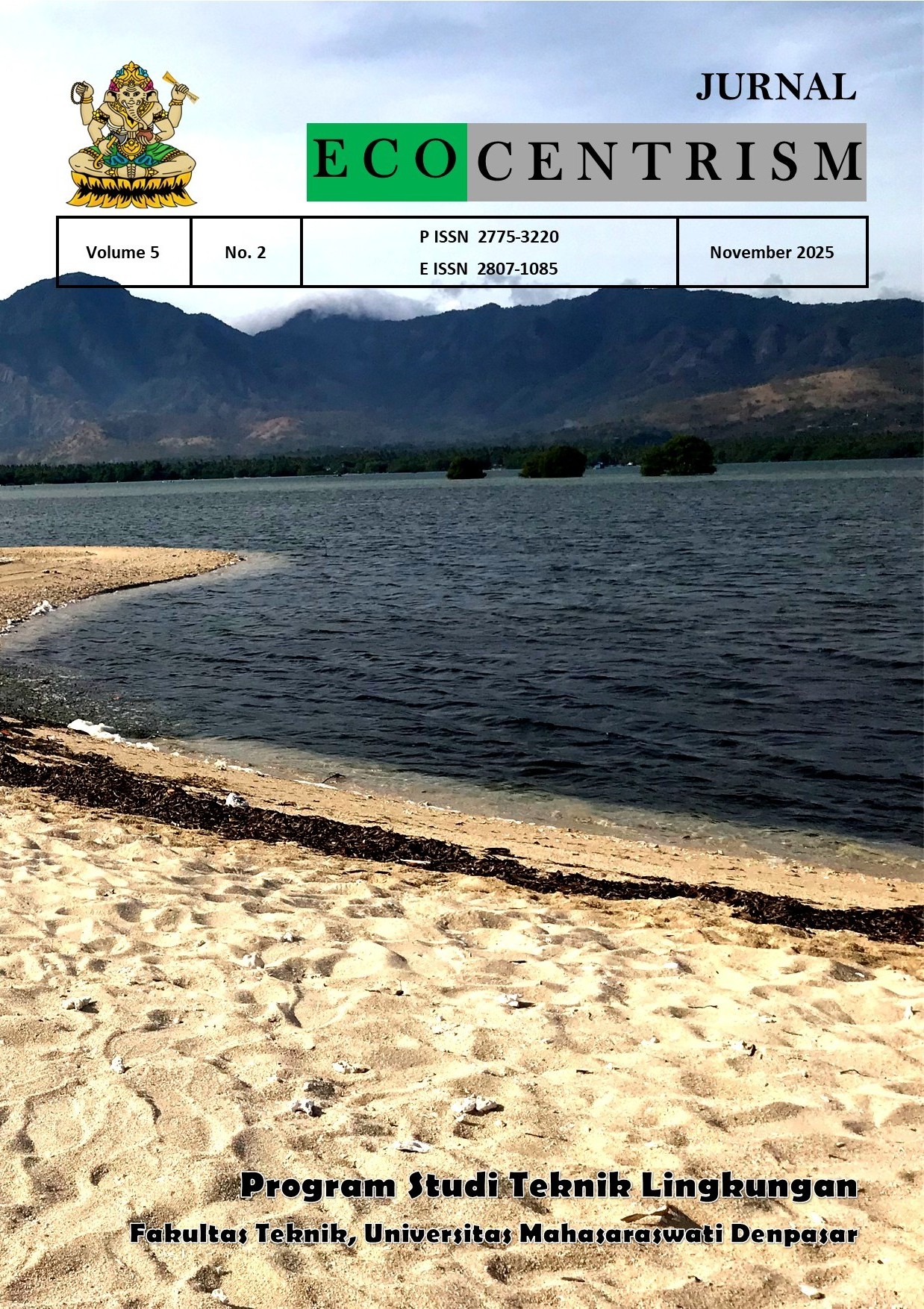TANTANGAN IMPLEMENTASI CIRCULAR ECONOMY DALAM PENGELOLAAN SAMPAH PERKOTAAN (STUDI KASUS: KOTA DENPASAR)
DOI:
https://doi.org/10.36733/jeco.v5i2.12813Keywords:
circular economy, green economy, waste management, environmental governanceAbstract
The transformation of waste management toward a circular economy has become a crucial agenda for urban sustainability in Indonesia, including Denpasar, the economic and tourism hub of Bali. This study aims to analyze the challenges in implementing a circular economy within Denpasar’s urban waste management system using descriptive-analytical approach based on secondary data from 2024. The findings indicate that although Denpasar has established a strong regulatory framework through Regional Regulation No. 3 of 2015 and Mayor Regulation No. 50 of 2018, its implementation still faces several structural constraints. According to data from the Denpasar Environmental and Sanitation Agency (DLHK) up to 2024, assessed at only 67%, the informal sector remained inactive (0%), and budget allocation waste management was relatively low (1.8% of the total city budget). Technically, the Denpasar DLHK Performance Report and several local media sources confirm that the Sarbagita Suwung Regional Landfill (32.4 ha) has exceeded its technical capacity. Limited public participation in waste segregation and weak cross-sectoral collaboration further hinder the realization of circularity. To achieve an environmentally resilient city, Denpasar needs to strengthen institutional collaboration, develop green financing Tri Hita Karana.
References
Balipost. (2025). Rencana Ditutup Pada 2026, Ini Perjalanan TPA Suwung Yang Jadi Penampungan Sampah Sarbagita Puluhan Tahun. https://www.balipost.com/news/2025/01/07/435698/Rencana-Ditutup-pada-2026,Ini...html.
Dinas Lingkungan Hidup dan Kebersihan Kota Denpasar. (2023). Profil Persampahan Denpasar Tahun 2023. Pemerintah Kota Denpasar.
Ellen MacArthur Foundation. (2019). Completing the Picture: How the Circular economy Tackles Climate Change. Ellen MacArthur Foundation. https://ellenmacarthurfoundation.org
European Commission. (2020). Circular economy Action Plan: For a Cleaner and More Competitive Europe. Publications Office of the European Union. https://environment.ec.europa.eu/strategy/circular-economy-action-plan_en
Kementerian Lingkungan Hidup dan Kehutanan Republik Indonesia. (2023). Panduan Implementasi Circular economy dalam Pengelolaan Sampah Perkotaan. Direktorat Jenderal Pengelolaan Sampah, Limbah, dan B3.
Kementerian Perencanaan Pembangunan Nasional/Bappenas. (2022). The Future is Circular: Langkah Nyata Inisiatif Circular economy di Indonesia.
OECD. (2020). Circular economy in Cities and Regions: Synthesis Report. Organization for Economic Co-operation and Development. https://doi.org/10.1787/10ac6ae4-en
Pemerintah Kota Denpasar. (2015). Peraturan Daerah Kota Denpasar Nomor 3 Tahun 2015 tentang Pengelolaan Sampah. Sekretariat Daerah Kota Denpasar.
Pemerintah Kota Denpasar. (2018a). Peraturan Wali Kota Denpasar Nomor 36 Tahun 2018 tentang Pengurangan Penggunaan Kantong Plastik. Sekretariat Daerah Kota Denpasar.
Pemerintah Kota Denpasar. (2018b). Peraturan Wali Kota Denpasar Nomor 50 Tahun 2018 tentang Kebijakan dan Strategi Pengelolaan Sampah Rumah Tangga dan Sejenis Sampah Rumah Tangga. Sekretariat Daerah Kota Denpasar.
Pemerintah Provinsi Bali. (2018). Peraturan Gubernur Bali Nomor 97 Tahun 2018 tentang Pembatasan Timbulan Sampah Plastik Sekali Pakai. Sekretariat Daerah Provinsi Bali.
Pemerintah Provinsi Bali. (2019). Rencana Aksi Daerah Pengelolaan Sampah Rumah Tangga dan Sejenis Sampah Rumah Tangga Provinsi Bali 2019–2025. Dinas Lingkungan Hidup Provinsi Bali.
Pemerintah Provinsi Bali. (2019). Peraturan Gubernur Bali Nomor 47 Tahun 2019 tentang Pedoman Pelaksanaan Nangun Sat Kerthi Loka Bali melalui Pembangunan Berkelanjutan. Berita Daerah Provinsi Bali.
Prihadi, D. J., Shalahuddin, M. R., Novianti, E., Junirahma, N. S., Pamungkas, W., Dhahiyat, A. P., Amida, S. B., & Lahbar, G. M. (2024). The 'Tri Hita Karana' ecotourism approach for sustainable marine resource management and tourism in Bali. International Journal of Marine Engineering Innovation and Research, 9(4), 858–869.
Siagian, Oscar R.H. (2025). Analisis Kelembagaan Dalam Transformasi Pengelolaan Sampah Skala Kota Berbasis Teknologi Refused Derived Fuel Yang Berkelanjutan Di Kabupaten Banyumas. JURNAL LOCUS: Penelitian & Pengabdian, 4 (7), 4498-4513.
United Nations Environment Programme (UNEP). (2022). Global Waste Management Outlook 2: Circular economy Pathways. United Nations Environment Programme. https://www.unep.org/resources/report/global-waste-management-outlook-2


